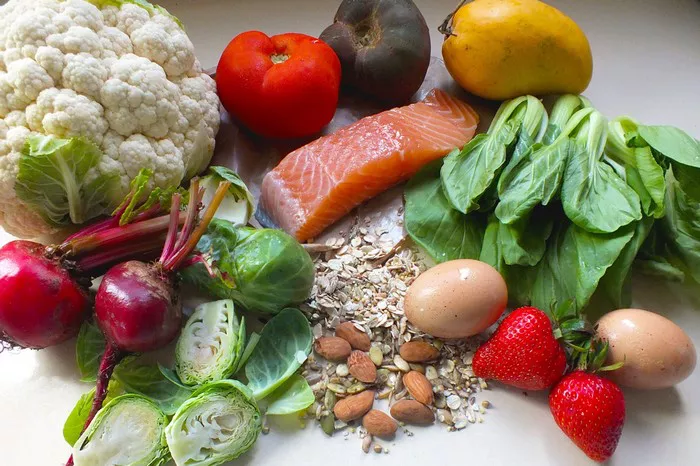Our hair is often considered our crowning glory, and maintaining its health and vitality is a goal for many. While external hair care products like shampoos, conditioners, and styling tools play a role, the foundation of beautiful, strong hair starts from within – specifically, with what we eat. A well-balanced diet rich in essential nutrients can have a profound impact on the quality, growth, and overall appearance of our hair. In this comprehensive essay, we’ll explore a vast array of foods that are beneficial for good hair health, delving into the specific nutrients they provide and how these nutrients work to keep our locks in prime condition.
Proteins for Hair Health
Why Protein is Essential for Hair: Hair is primarily made up of a protein called keratin. Just like any other part of our body that requires building blocks for growth and repair, our hair relies on a steady supply of dietary protein. Without enough protein in our diet, hair can become weak, brittle, and more prone to breakage. Protein provides the amino acids necessary for the production of new keratin, which helps in strengthening the hair shaft and promoting healthy hair growth.
Sources of Protein for Hair
Lean Meats: Chicken, especially skinless chicken breast, is an excellent source of high-quality protein. It contains all the essential amino acids that our body needs. A 3-ounce serving of cooked chicken breast can provide around 26 grams of protein. Chicken can be prepared in numerous ways, such as grilled, baked, or sautéed, and paired with a variety of vegetables and healthy fats for a balanced meal that supports hair health. Turkey is another lean meat option that is similar to chicken in terms of its protein content. It also contains tryptophan, an amino acid that can have a positive impact on mood, which indirectly affects our overall well-being and, consequently, the health of our hair.
B-Vitamins
Biotin: Biotin, also known as vitamin B7, is perhaps one of the most well-known vitamins for hair health. It plays a crucial role in the metabolism of fats, carbohydrates, and amino acids, all of which are essential for the production of keratin. A deficiency in biotin can lead to hair loss and brittle hair. Foods rich in biotin include eggs, almonds, sweet potatoes, and spinach. For example, a cup of cooked sweet potatoes can provide around 2.4 micrograms of biotin. Incorporating these foods into your diet regularly can help ensure an adequate supply of this important vitamin for healthy hair growth.
Niacin: Niacin, or vitamin B3, is involved in improving blood circulation to the scalp. Good blood flow is essential for delivering nutrients to the hair follicles, ensuring they have the resources they need to produce healthy hair. Sources of niacin include chicken, tuna, peanuts, and mushrooms. A 3-ounce serving of cooked chicken can provide about 11 milligrams of niacin. Consuming a variety of these foods can help boost niacin levels in the body and support optimal hair health.
Minerals for Hair Health
Iron: Iron is a vital mineral for hair health as it is involved in the transport of oxygen to the cells, including those in the hair follicles. Without sufficient iron, the hair follicles may not receive enough oxygen, which can lead to hair loss and slow hair growth. Good sources of iron include red meat, such as beef and lamb, which contain heme iron, which is more easily absorbed by the body. A 3-ounce serving of cooked beef can provide around 2.3 milligrams of iron. For those following a plant-based diet, non-heme iron sources like lentils, spinach, and fortified cereals are available. However, it’s important to note that non-heme iron is not as easily absorbed as heme iron, so pairing it with vitamin C-rich foods can enhance absorption. For example, having a spinach salad with orange slices can help your body absorb the iron from the spinach more effectively.
Zinc: Zinc is essential for many enzymatic reactions in the body, including those involved in hair tissue growth and repair. It helps maintain the oil glands on the scalp, keeping the scalp healthy and preventing dandruff. Zinc can be found in foods like oysters, which are one of the richest sources, providing about 74 milligrams per 3-ounce serving. Other good sources include beef, pumpkin seeds, and chickpeas. A quarter-cup of pumpkin seeds contains around 2.2 milligrams of zinc. Incorporating these zinc-rich foods into your diet can help keep your scalp in good condition and support healthy hair growth.
Omega-3 Fatty Acids for Hair Health
Benefits of Omega-3 Fatty Acids for Hair: Omega-3 fatty acids, specifically EPA (eicosapentaenoic acid) and DHA (docosahexaenoic acid), have anti-inflammatory properties that can improve the health of the scalp. They can reduce inflammation in the hair follicles, which is beneficial for promoting hair growth and preventing hair loss. Additionally, omega-3 fatty acids help keep the hair shafts hydrated and shiny by improving the lipid barrier of the hair, making it look healthier and more lustrous.
Sources of Omega-3 Fatty Acids
Fatty Fish: As mentioned earlier, fatty fish like salmon, mackerel, and sardines are excellent sources of omega-3 fatty acids. A 3-ounce serving of cooked salmon can provide around 1.5 grams of EPA and DHA combined. These fish can be incorporated into your diet a few times a week through various cooking methods, such as baking or grilling, and paired with a side of vegetables for a nutritious and hair-friendly meal.
Conclusion
Related Topics:



























